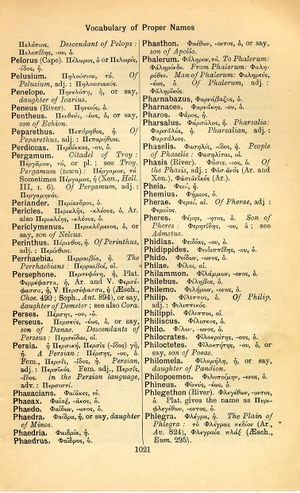Pelorus: Difference between revisions
From LSJ
ἐὰν ταῖς γλώσσαις τῶν ἀνθρώπων λαλῶ καὶ τῶν ἀγγέλων, ἀγάπην δὲ μὴ ἔχω, γέγονα χαλκὸς ἠχῶν ἢ κύμβαλον ἀλαλάζον → though I speak with the tongues of men and of angels and have not charity I am become as sounding brass or a tinkling cymbal
(D_6) |
(Gf-D_6) |
||
| Line 1: | Line 1: | ||
{{WoodhouseENELnames | {{WoodhouseENELnames | ||
|Text=[[File:woodhouse_1021.jpg|thumb|link= | |Text=[[File:woodhouse_1021.jpg|thumb | ||
|link={{filepath:woodhouse_1021.jpg}}]](Cape) Πέλωρος, ὁ or Πελωρίς, -ίδος, ἡ. | |||
}} | }} | ||
{{Lewis | {{Lewis | ||
Revision as of 07:44, 14 August 2017
English > Greek (Woodhouse)
(Cape) Πέλωρος, ὁ or Πελωρίς, -ίδος, ἡ.
Latin > English (Lewis & Short)
Pĕlōrus: (-os), i, m., and Pĕlōrum, i, n., = Πέλωρος,
I a promontory on the north-eastern coast of Sicily, the modern Capo di Faro: Peloros, Ov. M. 13, 727: Pelorus, Sil. 14, 78: Pelorum, Plin. 3, 5, 10, § 73; Mart. Cap. 6, § 646.—Hence,
II Pĕ-lōrĭtānus, a, um, adj., Pelorian: regio, Sol. 5.
Latin > French (Gaffiot 2016)
Pĕlōrus,¹⁴ ī, m., Sil. 14, 78, Pĕlōrŏs, ī, m. (Πέλωρος), Ov. M. 13, 727 et Pĕlōrum, ī, n., Plin. 3, 87, Pélore [promontoire à l’est de la Sicile].

